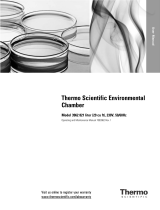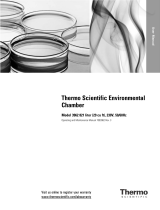Page is loading ...

3110 Series Temperature Sensor
Information
This document provides basic information about the proper operation and function of the
temperature sensor in the 3110 Series CO2 incubator. The sensor description, location,
method for testing, and common error types are outlined.
3110 Series CO2 Incubators
Revision Date: October 27, 2014
Temperature Sensor Information

3110 Series Temperature Sensor
2 of 7 www.unitylabservices.com/contactus
3110 Series CO2 Temperature Sensor
• The control and overtemperature (safety) sensors are thermistors.
• The glass bead thermistor is sealed inside a stainless steel protective sheath.
• These devices have a negative temperature coefficient (NTC). This means that as the
measured temperature goes higher, the resistance of the sensor (thermistor) goes lower.
• The full range of the temperature display is 0.0C to +60.0C
• If either sensor fails in an OPEN electrical state, the temperature display will read 0.0C
plus any positive offset from previous temperature calibration stored in memory.
• If either sensor fails in a SHORTED electrical state, the temperature display will read
+60.0C.
Photo of temperature/overtemperature sensor, part number (290184):

3110 Series Temperature Sensor
3 of 7 www.unitylabservices.com/contactus
Location:
• Both sensors are inserted into blower scroll in overhead chamber area.
Viewing temperature sensor values:
• Control temp sensor value is displayed in upper display.
• Overtemperature sensor value is displayed in lower display when “Down” arrow key is
pressed.

3110 Series Temperature Sensor
4 of 7 www.unitylabservices.com/contactus
Temperature Related Error Messages
SYS IN OTEMP- Cabinet at or above overtemperature setpoint.
Possible cause:
• Actual chamber temperature is greater than OTEMP setpoint.
• Temp setpoint too close to ambient. Reduce ambient temperature or increase
setpoint to at least +5C above ambient.
• Temp setpoint moved to a value lower than cabinet actual. Open door to cool
chamber or allow time for temp to stabilize.
• Temp sensor failure.
• Temp control failure.
• Excessive internal heat load. Remove source of additional heat (i.e. shaker,
stirrer, etc.)
TSNSR1 or TSNSR2 ERROR- Voltage from control or overtemp sensor circuit out of range.
Possible cause:
• Sensor unplugged.
• Poor electrical connection at temp sensor.
• Open sensor. Replace sensor.
• Shorted sensor. Replace sensor.
TEMP IS LOW- Cabinet temp at or below TEMP LOW TRACKING ALARM.
Possible cause:
• Extended door opening.
• Broken door contact (disables heaters).
• Temp control failure.
• Heater failure.
Actual temperature does not match displayed value.
• Incorrect calibration of temp probe. See below for calibration instructions.
• Defective temp sensor. See testing procedure below.
• Error in reference measuring equipment.
• Internal heat load changed. (i.e. heated sample, shaker or other small accessory
running in chamber.)

3110 Series Temperature Sensor
5 of 7 www.unitylabservices.com/contactus
Temperature Sensor Calibration:
• Place the calibrated instrument in the center of the chamber. The measuring
instrument should be in the airflow, not against the shelf.
• Before calibration, allow the cabinet temperature to stabilize.
o The recommended stabilization time from a cold start-up is 12 hours.
o The recommended stabilization time for an operating unit is 2 hours.
• Press the MODE key until the CAL indicator is illuminated.
• Press the RIGHT ARROW key until TEMP CAL XX.X appears in the display.
• Press the UP or DOWN arrow to match the display to a calibrated instrument.
o Note: If unable to change the display in the desired direction it is likely
that a maximum offset has already been entered during a previous
calibration. Test the sensor per instructions below and replace sensor if
necessary.
• Press ENTER to store the calibration into memory.
• Press the MODE key to return to RUN mode.

3110 Series Temperature Sensor
6 of 7 www.unitylabservices.com/contactus
Testing Temperature Sensors:
• The temperature sensor resistance value can be measured with an ohmmeter at a
specific chamber temperature.
• The unit should be disconnected from electrical power.
• Connector J4 should be disconnected from main pcb.
• The measured resistance value can be compared to the chart below.
• The nominal resistance at 25C is 2252 ohms.
• Control sensor (yellow wires) can be tested at main pcb connector J4 pins 7 and 8.
• Overtemp sensor (red wires) can be tested at main pcb connector J4 pins 5 and 6.
Electrical Schematic:

3110 Series Temperature Sensor
7 of 7 www.unitylabservices.com/contactus
Thermistor Temperature vs Resistance (2252 Ohms at 25C)
DEG C
OHMS
DEG C
OHMS
DEG C
OHMS
DEG C
OHMS
-80
1660C
-40
75.79K
0
7355
40
1200
-79
1518K
-39
70.93K
1
6989
41
1152
-78
1390K
-38
66.41K
2
6644
42
1107
-77
1273K
-37
62.21K
3
6319
43
1064
-76
1167K
-36
58.30K
4
6011
44
1023
-75
1071K
-35
54.66K
5
5719
45
983.8
-74
982.8K
-34
51.27K
6
5444
46
946.2
-73
902.7K
-33
48.11K
7
5183
47
910.2
-72
829.7K
-32
45.17K
8
4937
48
875.8
-71
763.1K
-31
42.42K
9
4703
49
842.8
-70
702.3K
-30
39.86K
10
4482
50
811.3
-69
646.7K
-29
37.47K
11
4273
51
781.1
-68
595.9K
-28
35.24K
12
4074
52
752.2
-67
549.4K
-27
33.15K
13
3886
53
724.5
-66
506.9K
-26
31.20K
14
3708
54
697.9
-65
467.9K
-25
29.38K
15
3539
55
672.5
-64
432.2K
-24
27.67K
16
3378
56
648.1
-63
399.5K
-23
26.07K
17
3226
57
624.8
-62
369.4K
-22
24.58K
18
3081
58
602.4
-61
341.8K
-21
23.18K
19
2944
59
580.9
-60
316.5K
-20
21.87K
20
2814
60
560.3
-59
293.2K
-19
20.64K
21
2690
61
540.5
-58
271.7K
-18
19.48K
22
2572
62
521.5
-57
252K
-17
18.40K
23
2460
63
503.3
-56
233.8K
-16
17.39K
24
2354
64
485.8
-55
217.1K
-15
16.43K
25
2252
65
469
-54
201.7K
-14
15.54K
26
2156
66
452.9
-53
187.4K
-13
14.70K
27
2064
67
437.4
-52
174.3K
-12
13.91K
28
1977
68
422.5
-51
162.2K
-11
13.16K
29
1894
69
408.2
-50
151K
-10
12.46K
30
1815
70
394.5
-49
140.6K
-9
11.81K
31
1739
71
381.2
-48
131K
-8
11.19K
32
1667
72
368.5
-47
122.1K
-7
10.60K
33
1599
73
356.2
-46
113.9K
-6
10.05K
34
1533
74
344.5
-45
106.3K
-5
9534
35
1471
75
333.1
-44
99.26K
-4
9046
36
1412
76
322.3
-43
92.72K
-3
8586
37
1355
77
311.8
-42
86.65K
-2
8151
38
1301
78
301.7
-41
81.02K
-1
7741
39
1249
79
292
80
282.7
/




